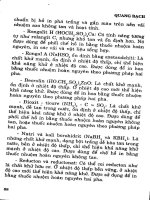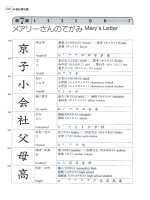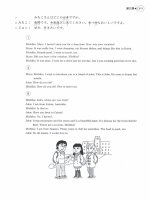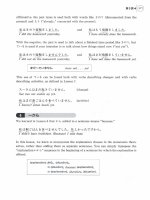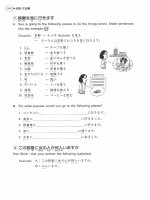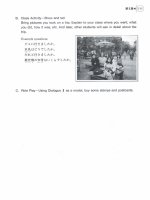genki 1 an integrated course in elementary japanese1 phần 5 docx
Bạn đang xem bản rút gọn của tài liệu. Xem và tải ngay bản đầy đủ của tài liệu tại đây (4.49 MB, 35 trang )
B.
Glass
Activity-Show
and
tell
Bring
pictures
you
took
on
a
trip.
Explain
to
your
class
where
you
went,
what
you
did,
how
it
was,
etc.
And
later,
other
students
will
ask
in
detail about
the
trip.
Example
questions:
C.
Role
Play-Using Dialogue
I[
as
a
model,
buy
some
stamps
and
postcards.
@5
Uh,
3&<
At
the
Post
Office
Usefu,
Expressions
tkt,
%;@c>
L
3
T,
Cam
YOU
tak-e
care
of
thk,
please?
b?dZ
~+PJQ#Qz~~{
~LZ'~L\~
Give
me
fhree
50-yen
stamps,
please.
z
3
?&Ark
'as
C
&L\hxhx
9
2
?hx,
Him
maay
days
will
it
take?
t*/;C-G
It
will
be
150
yen.
Useful
Vocabulary
gw
counter
a
Prf
td
6i
1
postcard
Anothef
100
yen,
please.
stamp
37
<
Z
7
17
57*
3
A
aerogramme
4.
E
;
9-27,
parcel
He
L.3
Lt
letter
&2E
airmail
@ME!
surface
:i
(iVL
i.QV'L
%t%
insurance
8s
special
delivery
ti
Iih
+
{f;9
8%
registered mail
h.1
Zrh
Stamps
Postcard
tlp
I,,'"
B
At
a
Photo
Shop
Customer
:
T&~*L,
%~%LSBIL~L~T,
C
i
fi?
Excuse
w.
I'd
like
a
reprznt,
plmsa.
Shop
cIerk
:
t2
L
h,
%Xdj
'1
5
L
~\T~75*,
:if:(
Cerfuinly.
Would
the
glossy
fiaish
be
all
right?
Customer
:
Shop
clerk
:
Customer
:
Shop
clerk
:
Customer
:
E;1:~1,
Yes.
z
z
l=Z%Z%S*-%%~@~~L2To
2
3
TL.
.b
LI&;i
ahC
PZgme
fill
zn
yoar
name
uad
telephone
number
here.
~'\3T3
a
T75*,
Whm
will
if
be
ready?
I-ZJL&~
3
133-35;
13
@s%TT,
L
A
Cmi
z
11%
iX,
U
It
will
be
ready
at
three
o'clock
on
the
15th.
2
a51
3#2%$#$9
T
3
7
<
f<3~h~
u
n.
rtk
&
Please
brim
thzs
receipt.
;h&.')
3
Lf:,
EF,
S@L\L$TO
tl*<
All
ri&ht
Tha~k
you.
Shopclerk:
#!19;tr~Z?Z*~~\4Lf=,
Thank
you
very
much.
Useful
Vocabulary
%3@L
reprint
5-
1
%RE
development
IfLFi
%iR&
9
:if:<
glossy
finish
%?rrQ
L
:if:(
mat
finish
791
97
panoramic
z5-f
F
slide
1
7'12).
Sfl
negative
I-fL
hz
!J
date/time
something
is
ready
7
.F
IL
A
film
1
(
24;EtlV
jb\
Y
24-print roll
%%
Th.
lj
battery
I
.I&
\#%
T
21
%
3
-disposable
camera
91
3&2%
receipt
7
t
V
5.
It&
jy-bshCT)-FJ
A
Day
in
RobertYs'Life
A
Dialogue
tPL1
a
a
in
the
class.
@
After
class.
@
On
the
bus.
Prof.
Yamashita:
Robert,
pIease
read
the
next
page.
Robert:
.
.
.
Prof.
Yamashita:
Robert,
please
wake
up.
You
cannot
sleep
in
the
class.
Robert:
Mr.
Yarnashita,
I
forgot
to
bring
the
textbook.
Prof.
Yamashita:
Please
bring
your
textbook
with
you.
We
use
it
everyday.
Robert:
I
understand.
I'm
sorry.
Sue:
Robert,
you
had
a
hard
tirne
today.
Robert:
Yes.
May
I
borrow
your
notebook
later,
Sue?
sue:
Yes.
Robert:
Thank
you.
I'Il
return
it
soon.
Sue:
Robert,
we
will
have
a
test tomorrow.
Robert:
Really?
Sue:
Yes.
You
were
absent
from
the
class
last
Friday.
(That's
why you
didn't
know
about
it.)
Robert:
Well
then,
I'll
go
home
and
study
today.
Old
woman:
Excuse
me.
Does
this
bus
go
to
the
city
hospital?
Robert:
Yes,
it
does.
Take
this
seat,
ma'am.
Old
woman:
No,
thank
you.
I'lI
get
off
soon.
Robert:
Is
that
so?
Then,
shall
I
carry
your
bag?
Old
woman:
Thank
you.
%
ha&
S&
money
*
i%C2#53,4,
grandmother; old
woman
#S
Via
G
gag
bath
hl
k
C
ST
kanji;
Chinese
character
*
,4~5h*t1
%?w
textbook
t&t@?
,+a
this
week
*
tkkUi*l
9
WL
iW%%f!%
Municipal
Hospital
*
93-
;k
next
video
game
electricity
train
baggage
page
window
night
next
week
next
year
tough
(situation)
U-verbs
E&,
-?LC
2%
.j;
to
play;
to
spend
time pleasantly
~\3
(Q
,%
{
to
hurry
~2.5
lcia~~&
%;B,gttA&
totakeabath
to
return
(things)
(persm
Ct
thing
&)
to
turn
off;
to
erase
(-
2
ta
die
to
sit
down
(seat
1:)
to
stand
up
to
smoke
touse
(me)
to
help
bemm/tmk
2
)
*
Words
that
appear
in
the
dialogue
(I)
to
be
absent
(from
. .
.
)
k-4)
(2)
to
rest
to
open
(somethhg]
(-
to
teach;
to
instruct
(persm
k=
fhi~g
2
)
FPV
6
to
get
off
(-
2
)
%3
b
to
borrow
(persora
it
thiag
&
1
to
close
(something)
(%
2
1
qd'f
b
toturnon
(-%)
Thb
5
&hi)
b
%%3?
haCf
b
to
make
a
phone
call
(perso#
It)
6&%
to
forget;
to
leave
behind
(-2)
Irregular
Verbs
9h-C
4
T
to
bring
(a
person)
(-
2
*
&9f<
6
%
7
7
&
to
bring
(a
thing)
(-
2
)
Adverbs
and
Other
Expressions
*
&KT
4RT
later
on
sq
{
i@
{
(do
something)
late
*
-&a&
because
. .
l?-3Z$T-f
That
would
be
fine.;
That
wouldn't
be necessary.
right
away
*
l3&Z
5
T?ha
+
3
Tp
Really?
@7{
',
slowly;
leisurely;
unhurriedly
making
requests
(".
.
.
,
please.")
=
giving
and
asking
for
permission
("You
may
. .
./May
I:
.
.
."I
stating
that
something
is
forbidden
("You
must
not
. .
."I
forming
a
sentence
that
describes
two
events
or
activities.
("I
did
this
and
did
that.")
The
conjugation
paradigm
of
te-forms
is
fairly
complex,
as
we
need
to
learn
separate
rules
for
ru-,
u-,
and
irregular
verbs.
Furthermore,
the
rule
for
%-verbs
is
divided
into
five
submles.
First,
with
m-verbs,
the
rule
is
very
simple:
Take
&
off
and
add
T.
ru-verbs
Slqa
I
+
B<z
f;
U-verbs
come
in
several
groups,
based
on
the
final
syllable
of
their
dictionary
forms.
1
u-verbs
with
final
3,
3,
and
b
'As
we
discussed
in
Lesson
3,
some
verbs
that
end
with
the
hiragana
S
are
m-verbs
and
some
others
are
u-verbs.
The
rule
of
thumb
for
determining
which
verb
is
which
is
to
examine
tke
vowel
before
the
frnal
4
syllable.
If
the
vowel
is
n,
o,
or
u,
the
verb, without
any
exceptions,
is
an
u-verb.
If
the
vowel
is
either
a'
or
e,
the
verb
can
be
either
an
u-verb
or
a
m-verb.
Statisticdly
speaking,
there
are
many
more
m-verbs,
than
u-verbs
in
the
im
and
em
camp,
but
there
are
many
important
verbs
in
the
minority,
such
as
A
b
(to
enter),
and
%
5
Ito
return).
IS.
d.%
-
.
am
.*-im
{
:
. .
om
}
=
.ways
verbs
{.
.
+
em1
=
often,
but
not
always,
m-verbs
Urn
As
far
as
k-forms
are
concerned,
we
observe
that
u-verbs
that
end
with
d
will
have
a
small
9,
m-verbs
that
end
with
$
do
not.
+
ts
u-verbs
with
final
6,
13,
and
&I
sd3
A-
+
ShC
&-
ails
*-
u-verbs
with
final
<
There
is
an
important exception
in
this
class:
u-verbs
with
final
<
%<
*A-
+
ZLIr
u-verbs
with
final
3
3-T
+
ZL7
Biz
The
irregular
verbs
T
&
and
<
6,
and
compound
verbs
built
with
them,
conjugate
as
follows.
irregular
verbs
TZi
3
t7
Note
that
te-forms
and
stems
(the
foms
you
find
before
3
?)
are
totally
different
con-
structs
in
the
a-verb
camp.
A
common
mistake
is
to
assume
that
the
simple
paradigm
provided
by
the
ra-verbs
(&KT
and
3
9)
covers
the
u-verbs
also,
thus
corning
up
6
f;
with
unwarranted
forms
such
as
x
42~
.\
f
(see
-%L
3
5f)
and
x
%&
f
(see
%A
4.
TI.
It
is
h
&
I
I
probably
easier,
at
this
stage
of
learning,
to
memorize
each
verb
as
a
set,
as
in
%
<
-*
h.
6-
Q
3
T-TiW\T,
than
to
apply
the
conjugation
rules
on
the
spot.
Refer
to
the
verb
conjuga-
6-
tion
table
at
the
end
of
this
volume.
Use
a
verbal
&-fm
together
with
<
E3
1%
to
make
a
polite
request
ta
mother
perwn
2
"please
do
.
.
.
for
me.
FS
%f+&a,F-7%Mb~\
{
(33
Ll0
3ri
+
t
r
Please
listen
to
the-tape
thaf
goes
with
the
tatbook.
TA$*L,
3;d;
r%;?_-c
{
7"i3~\,
k
L
Excuse
me.
Pleuse
teach
me
a
little.
(=
Tell
me,
I
need
your
advice.)
A
verbal
ie-form
plus
%
i
xb
\TT
means
''you
may
do
.
,
.
,"
which
describes
an
activity
that
is
permitted.
To
ask
for
permission,
you
can
turn
it
into
a
question
sentence,
-C
&
~lb\T-ifBS.
May
I
see
the
textbook?
Yes,
you
may.
To
deny
somebody
permission
to
do
something,
you
can
use
the
te-form
plus
i2
I
\
l-f
2
%
h.
No,
you
my
not
see
the
textbook.
,
Describing
Two
Activities
You
can
use
a
tiifam
if
YOU
want
to
combine
two
or
more
verbs,
as
in
decribing
a
sequence
of
events
or
actions
f"I
did
this
and
then
I
did
that").
In
other
words,
the
te-form
does
the
work
of
"and"
with
verbs.
(Note
that
two
verbs
cannot
he
joined
by
E,
which
only
connects
now.)
1-1.6?E3T,
~'-L2-f0
5-
I
will
borrow
her
notebook
land
xerox
it.
21f
you
are
talking
to
a
very
close
friend
or
a
member
of
your
family,
a
te-form,
by
itself,
can
be
used
as
a
request.
E5?aF1l-fT0
*r
h
Opm
the
widow,
will
you?
-+ma,
*s$i=s~,
asta
~i.;,
5<
L-
L;
+c313
?Say
I
got
ap
at
six
ad
sfudied
&9i=?f7
7,
&kL*t&&@'&~~
t
k
3.
Li(Ti
r>
U.
6
Let's
go
to
the
cafeferia
ondf=haoe
lmch.
The
te-form
of
a
verb
can
also
be
used
to
connect
a
verb
more
"loosely7'
with
the
rest
of
a
sentence.
In
the
first
example
below,
the
verb
in
the
te-form
describes
the
manner
in
which
the
action
described
by
the
second
verb
is
performed.
In
the
second
example,
the
te-form
describes
the
situation for
which
the
apology
is
made.
1\*rct=%7<(:,
&*Gt%T3
$To
n
~-I\L+
rr
I
go
to
work
by
bus.
(I
take
a
bxs
to
work.)
@++B%&tLT,
T&$*X/,
3
fr
L
b3
I
am
sorry
for
not
bringkg
in
the
textbook.
(I
left
the
book
at
home,
and
I
ant
sorry.)
In
Lesson
5
we
lcamecl
F
t
a
j
d*
meaning
"let's
.
,
.
."
3
L
-a
-i
h-
is
alsa
used
in
the
sense
of
'^'let
me
do.
.
.
,"
in
offering
assistance.
If
you
see
somebody
having
a
hard
time
ope
the
lid
of
a
bottle,
for
example,
you
can
offer
help
by
saying:
-%
C$Lr4")
.*
9
3
t
1
?
J;ra*
1'8
do
it.
W:L
-
p~
'The
explanation
clause:
may
dm
precede
the
sitxiation
clause.
Thus
the
first
example
above,mn
aIsa
be
paraphrased
as
:
&Lk?XF8'&9
dJdlh.
Q,CA+J&1L33,
*L
;.LU;L-&3ri
We
will
diseu5s
this
furtfier
in
Lesson
9.
Or
to
a
person
who
is
carrying
a
heavy
bag:
R@&R't;$
t
a
7
b
Shall
I
carry
your
bag?
Expression
~otsra
,-
-
i!E<
/EL\
b
Although
both
Btl
and
B
<
mean
"late,"
they
have
different
st
8-E
'
f
SF
usages,
since
B
th
is
an
adj
ecbve
and
2Z
C
is
an
adverb.
Bbl
modifies
nouns
s+
=-
l.p
or
works
as
a
predicate,
and
B
<
modrfies
verbs.
SF
A:
3@4 @t~XF£9L7~,
Iwenftobedlatmeo'cbckyesterday.
w9
C
k2
B:
Bl.~T-T;Ba,
*?
If's
hte.
BZtzi2.
+@Z+*3&23T.
BL~$Y~~~~~&~~T~
LrpSt
7
Cwi
C
B
Sf
Bb
On
weeken$
I
get
ap
momd
10:UO
and
eat
kte
Breakfasf.
PD3,
s<s3
tfz*
Be
h
I
went
to
bed
late
yestwduy.
You
can
also
apply
this
rule
to
F
<
/F
tl.
MP
Me
Z36b
.F5B
is
normally
used
with
&9#."3,
as
in
E'5b&!l;6,9k3
(Thank
you
very
much),
or
with
$&&*A,
as
in
E-5
$3+AP3?h,
(I
am
very
sorry/Thank
you
very
much).
When
used
alone,
it
is
an
abbreviation
of
E4
8
;$i
'3
$2
3
or
Z3
B
T&P%kR.
Therefore,
when
you
want
ta
show
your
gratitude
or regret,
you
can
just
say
E
5
h
instead
of
saying
a
long
sentence.
F
4
B
functions
in
many
ways,
depending
on
the
situation.
Some
people
use
E
3
6
as
"hello"
or
"good-bye,"
SF
Many
words
that
begins
with
k
can
also
be
used
without
it.
%
in
such
words
simply
adds
smoothness
and
nuance
of
social
refinement,
without
changing
the
meaning
of
the
words.
Example
:
g$
ERE
4.3
RE9
Practice
nh
L@5
!("p
d*6M137<
b"
fSL1
%E
Z
A.
Change
the
following
verbs
into
te-forms.
@
Example:
3
6
+
3
7
1.
2.h.j
3.
LC
4.
hL
(
5.
(
b
6.
$9
7.
&:
8.
Z6
936
10
ll.~\{
12.
&b
13.
L
LI
1
3
15.
75.2
4
8.
Let's
sing
a
te-form
song!
(Battle
Hymn
of
the
Republic)
@
Jl*
h3
$577
27
39-r
YzJ
Y9-C
LC
;.Ah
hi:
La
LLT
ha{
75a~hT
1fL-C
L\+C
k\?bhT
khfd
u-verb
k-form
)2.
$74
7
+:
/vT
{
b
*
L\T
(repeat
twice)
'jf
L
T
u-verb
te-form
C.
What
will
you
say
when
you
want
someone
to
do
the
following
things?
Example:
to
speak
slowly
+
@
7
{
!J
3
L
7
<
f3
3
Z.
\,
Il
ta'
1.
to
calI
you tomorrow
3.
to
open
the
window
5.
to
teach
you
kanji
7.
to
wait
for
you
9.
to
go
to
a
hospital
11.
to
bring
a
friend
2.
to write
a
letter
4.
to
drink
tea
6.
to
bring
a
drink
8.
to
come
with
YOU
10.
to
return
your
book
12.
to
stand
up
D.
What
would
you
say
in
the
following situations?
Example:
??
h?
<
f?
3
ho
arr
h
Ex.
(1)
E.
Pair
Work-Make
your
own
request,
such
as
"Please
stand
up"
and
"Please
take
a
picture,"
and
ask
your
partner
to
act
it
out.
Example:
A
:
3
-
k
-
2
T'
<
'23
3
>,
+
B
pretends
to
drink
coffee.
0
A.
You
are
staying
with
a
host
family.
Ask
your
host
family
for
permission
to
do
the
following
things.
@
Example:
Y
5-Lls'$KT%~,h~\T-j-h~,
K
k
B.
What
would
you
say
in
the
following
situations?
Make
sentences
with
T%t\
LITq;h\.
1.
You
are
in
dass.
You
realize
you
need
to
go
to
the
bathroom
as
soon
as
possible.
2.
You
are
in
class.
You
feel
sick
and
want
to
return
home.
3.
You have
forgotten
to
do
the
homework.
You
are
sure
you
can
bring
it
in
tomorrow.
4.
You
want
to
ask
your
teacher
something,
but
you
cannot
phrase
it
in
Japanese.
5.
You
want
to
smoke
in
a
coffee
shop,
and
there
is
someone
sitting
nearby.
6.
You
are
at
a
friend's
house,
and
suddenly
remember
that
you
need
to
make
a
phone
call.
7.
You
have
run
into
a
celebrity.
Conveniently,
you
have
a
camera
with
you.
8.
You
have
arrived
at
a
classroom.
The
air
is
stuffy.
9.
You
and
your
friend
are
in
a
dark
room,
and
you
feel
somewhat
uncomfortable.
C.
You
are
a
strict parent.
Tell
your
child
not
to
do
the
following
things
using
the
cues
in
A.
@
Example:
?bW??R&
+
~i-L$2,%TE~t\~?~~A/.
k
k
D.
Tell
the
class
what
we
can
and
can't
do
at
school
and
at
a
host
family's
house.
Example:
%%?T
fz
1%
t
2
%7
T
t;f
I
\
if
3
-@
bo
d:~;?
9-
$2
b
7
Y
E
'I
-
(host
My)
9
Gcr"$fi-k;RZ
b=A-z~
T
%
thb\TT,
%is
3.6
lit\
@B~E~T,J-~-EER~B$
as%
$3
m
A.
Look
at
the
pictures
below
and
combine
the
pictures
using
te-forms.
@
Example:
$d&i3
T,
~-k-??&&aT,
6%
tj
n
Ex.
+
6.
Change
the
following
into
te-forms
and
make
the
rest
of
the sentences.
Example:
+
%&$T,
$$~~%A~~.
A?
%
h3
i+
LL;:X,
k
I.
&f-:%m5
W=e{
lit
I3
2-
=I
%
b=%4
h+*
3-
%*2%9
&
t&Lr
$i
4-
&T:.%
I=*$
L
f
A
i.
4
lit?
Ersb:<
I,
5.
SB,%
Gch%
6.
AYt3T
{
@I\";(EIu3bd0
a
~~h3%!l$~h;b\60
1;
h'h
A.
Add
reasons
to
the
following
sentences.
-
Example:
~~ZEt3k33-P'~
+
2~XE=3k33.TO
%Bn7&%h3*&hxb.
0
W
U
h.X.
1.
kSt33i%T
L
2%
WALni
Pl%-X,
2.
&m&&GR2*h,
2
k
3.
;~~QIL;CF~=/GC~~&L~=,
I
\
4.
3n-j
yyx-maa
L~Z,
c-f
5.
(name
of
a
friend)
fi'A8
3
TT,
f.~b
-f
B.
Pair
Work-Ask
each
other
why
you
think
the
following.
3.
Z*,
(name
of
a
movie)
2
R
3
To
L~jl3
k
4.
3
c?)
9
.
(name
of
a
restaurant)
ice
3
3
L
tz
't,
l,
5.
G*breth*h&
3
a
*A,,
&a).
6.
~+i;f:a+~2~~t~-tsr;/,
%I~C~X,
f:
13&
Z
KL>ri
7.
~~,
(name
of
a
place)
&I%
3
3
To
&L>Llp3
I
I
8.
I;r%$2Z~~a?,
L'
TXILc
h*
Pair
Work-Propose
to
do
the
following
things,
using
t
L
b
9f1?
@
$
&bJCDR#
(Review
Exercises)
;nhJ
L@3
A.
Role
Play-Play
the
roles
of
A
and
B
with
your
partner.
Example:
Exam
ple-A
You
are
short
of
money
and
want
(
to
borrow
some
money from
your
1
1
friend.
Exam
ple-B
You
are
going
on
a
trip
tomorrow.
1
You
don't
have
money
to
lend
to
(
1
your
friend.
You
have
a
date
tomorrow
and
want
to
borrow
a
car
from your
friend.
2-A
You
Iost
your
Japanese
textbook,
but
you
need
to
study
for
a test
tomorrow.
1
-B
You
just
bought
a
brand-new
car
and
don't
want
anyone
to
use
it.
You
have
a
big
test
in
Japanese
and
need
your
textbook
to
prepare
for
the
test.
3-A
You
are
asked
to
return
your
friend's
video
today,
but
you
for-
got
to
bring
it.
You
want
to
return
it
tomorrow.
I
3-B
You
asked
your
friend
to
return
your
video
today.
You
need
it
today
because
you
want
to
watch
it
together
with
another
friend.
You
are
now
in
your
friend's
house.
You
see
a
cake
that
looks
(
very
delicious.
You
love
cakes.
I
4-B
You
just
baked
a
cake
for
your
mother's
birthday.
Your
friend
is
in
your
house
now.
B.
Answer
the
following
questions.
1.
-+Sol%,
2
L
3
thx,
(~nswer
with
"%
T
.
-,
"1
CCvLlpi
lni17
Qi:
2.
?#@3,
d:(EJ&LsLfzc,
(~nswerwith"~~.~.")
Z-Ct
r3
his
3.
@g@TR2
tTbba~\133*h$~~
L
LI?YX,
21:
4.
g*a+Tklfz
2R7
7
%
~~~~T-$hX0
f/yL+
t**.
T
5.
AFt=rn&%3-c33Tfix0
t;'r\8(
i
t
6.
k
{
%*
t3k
!J
2
ThLr
a
7.
*a,
%-3B2S$L3
LkfiAo
+?/dm+
C*(f;'rl
hf
8.
FWM.
r~-cava
ti~;ps.,
LYb
r3
A
P
9.
3#me,
k
(
S@LL&+EL\~
Lifi$%o
L
r
6-
b
T
7~;'
lo.
EISB-r-k
{
*24%
'3
2
"ph
z
Ll*/"
l3.L
il-
11.
L
t;
?7-7fW-&2d-6+,
r-t
Usekr!
Expressions
39TCW
I
I
ko
straight)
;&I:#&%
AS
i
(turn
right)
(turn
left)
-7a
aE%
2%
t-&7F%
0.z
at,
LJLZi
AS
f
(turn
right
at
the
first
signal)
=-s,€i
QIB
2&4:@;tr2&
2.t
n
iibt~
uf:l
2
(turn
left
at
the
second
corner)
(cross
the
street)
S~r)&@l
htj
&'t-'l6'b
Sc3*@1
kt;
k'dib
(left
side
of the
street)
(right
side
of
the
street)
Directions
3k
3
k
(north)
s
Mi,-=,
(south)
(west)
A
:
364&*A/,
@f?%~bY=C.t-&*,
rp
i
bb3-A
I
Excuse
me,
where
zs
a
gosf
offie?
B
:
3
9T
cfiq
T,
ZQH
QIB
2&i=&&'7
T
I,
A
n
+r
~r
2
(
f:2~\,
@jEG
iAsa&i@l
t=
9
2
-T
1
0
vpiLF/V3~:(
A%
kYQ'b
Go
straight
and
twm
right
at
.the
third
comer.
The
post
office
is
on
the
rzght
(east)
side
of
the
strget.
A
:
Z*
j
%
;Bj
9
hrtS
3
2"5+k\f
To
Thank
you
very
much.
*
a'$&CI)'f'E
-
Family
Picture
errr
%
@
Sue
is
showing
a
picture
of
her
family
to
her
roommate,
Michiko.
@
A
phone
rings
in
Sue
and
Michiko's
room.
Michiko:
Is
this
your
family
picture,
Sue?
Sue:
Yes.
Michiko:
Which
is
you?
Sue:
This.
I
was
wearing
gIassses
when
I
was
in
high
school.
Michiko:
You
are
cute.
Sue:
This
is
my
father.
He
works
for
an
American
company.
Michiko:
He
is
tall
and
handsome,
Is
this
your
elder
sister?
Sue:
Yes.
My
sister
is
married.
She
lives
in
Seoul
now.
She
has
one
child.
He
is
three
years
old.
Michiko:
I
see.
Oh,
there
is
a
cat.
But
he
is
a
little
fat.
Sue:
Yes,
because
he
eats
a
lot.
Robert:
Michiko,
what
are
you
doing
now?
Michiko:
I'm
not
doing
anything
especially.
I
am
looking
at
Sue's
pictures.
Robert:
I
see.
I
have
an
interesting
video,
so
if
you
like,
would
you
like
to
come
to
see
it?
Michiko:
That
sounds
good.
Is
it
all
right
if
Sue
comes
with
me?
Robert:
Of
course.
Michiko:
We'll
come
right
now.
(my)
older
sister
apartment
younger
sister
song
younger brother
man
older
brother
older
sister
woman
company
family
hair
brothers
and
sisters
country;
place
of
origin
car
convenience store
cafeteria;
dining
commons
(my)
father
T-shirt
eye
glasses
bright;
smart;
clever
(conjugates
like
L
1
L
1)
great-looking
(conjugates
like
l\
L
\)
cute
tall
short
(stature)
long
fast
short
(length)
*
Words
that
appear
in
the
dialogue
a-adjectives
th-@7(2Fb)
%R#
kind
i-l(Q)
E$'l
convenient
to
sing
to
put
on
(a
hat)
to
get
to
know
I
know
I
do
not
know
to
live
(-lzTATk\3
TI
to
put
on
(items
below
your
waist)
to
gain
weight
to
be
on
the
heavy
side
to
put
on
(glasses)
to
put
on
(clothes
above
your
waist)
to
work
for
( czTz~~,L\\~)
to
lose
weight
to
be
thin
to
get
married
(-
Adverbs
and
Other
Expressions
6
5
but
*
3
I=
$
-I
negative
%
not
.
. .
anything
t=A
A
[counter
for
*
VZ
9
A
one person
;at=
9
ZA
two
people
*
+7
C
l
f
negative
4'1
C=
not
.
.
.
in
particular
*
$CSA
of
course
*
dt;7!l57?:h
if
you
like

